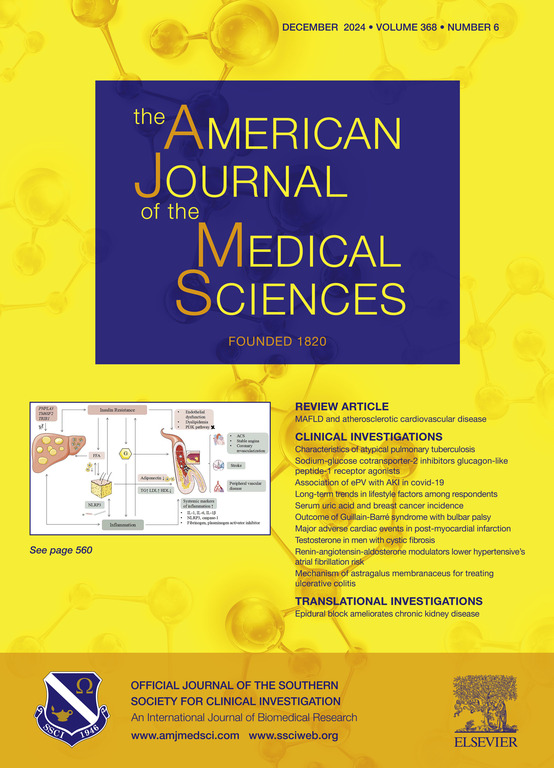The relationship between dietary niacin intake and the incidence of all-cause and cardiovascular mortality among chronic kidney disease patients
IF 2.3
4区 医学
Q2 MEDICINE, GENERAL & INTERNAL
引用次数: 0
Abstract
Background
Chronic kidney disease (CKD) is a major cause of human mortality and cardiovascular disease (CVD)-related death. Niacin can treat dyslipidemia and can lower overall cardiovascular event incidence and mortality rates. The present study was designed to clarify the link between dietary consumption of niacin and cardiovascular mortality.
Methods
This study enrolled subjects ≥18 years of age from the National Health and Nutrition Examination Survey 2009-2014 and excluded any individuals for whom data regarding their CKD status, dietary niacin intake, or other covariate information was unavailable. Relationships between dietary niacin intake levels and overall or CVD-related mortality among these CKD patients were assessed using univariate and multivariate Cox regression analyses.
Results
The study included 1,798 subjects and recorded 514 and 186 instances of all-cause and cardiovascular death, respectively. Males comprised 51.8 % of the study cohort, and the mean age of these subjects was 65. Cox proportional hazard model analyses revealed no relationship between dietary niacin intake and all-cause or cardiovascular death risk among the overall CKD patient population (P > 0.05). However, in age-stratified analyses, those subjects <60 years of age exhibiting the highest levels of dietary niacin consumption (≥ 38 mg/day) were found to face a significantly higher risk of all-cause mortality, and this association remained intact in sensitivity analyses.
Conclusion
These results do not support any link between the dietary intake of niacin and all-cause or cardiovascular mortality risk among patients with CKD. Age and niacin intake exhibited a significant interaction related to all-cause mortality.
慢性肾病患者饮食烟酸摄入量与全因死亡率及心血管死亡率的关系
背景:慢性肾脏疾病(CKD)是人类死亡和心血管疾病(CVD)相关死亡的主要原因。烟酸可以治疗血脂异常,降低心血管事件的发病率和死亡率。本研究旨在阐明饮食中烟酸摄入与心血管疾病死亡率之间的联系。方法:本研究纳入了2009-2014年国家健康与营养调查中年龄≥18岁的受试者,排除了CKD状态、饮食烟酸摄入量或其他协变量信息不可用的个体。使用单变量和多变量Cox回归分析评估这些CKD患者饮食烟酸摄入水平与总体或心血管疾病相关死亡率之间的关系。结果:该研究包括1,798名受试者,分别记录了514例和186例全因死亡和心血管死亡。男性占研究队列的51.8%,这些受试者的平均年龄为65岁。Cox比例风险模型分析显示,在整体CKD患者人群中,饮食中烟酸摄入量与全因或心血管死亡风险之间没有关系(P < 0.05)。结论:这些结果不支持饮食中烟酸摄入与CKD患者全因或心血管死亡风险之间的任何联系。年龄和烟酸摄入量与全因死亡率有显著的相互作用。
本文章由计算机程序翻译,如有差异,请以英文原文为准。
求助全文
约1分钟内获得全文
求助全文
来源期刊
CiteScore
4.40
自引率
0.00%
发文量
303
审稿时长
1.5 months
期刊介绍:
The American Journal of The Medical Sciences (AJMS), founded in 1820, is the 2nd oldest medical journal in the United States. The AJMS is the official journal of the Southern Society for Clinical Investigation (SSCI). The SSCI is dedicated to the advancement of medical research and the exchange of knowledge, information and ideas. Its members are committed to mentoring future generations of medical investigators and promoting careers in academic medicine. The AJMS publishes, on a monthly basis, peer-reviewed articles in the field of internal medicine and its subspecialties, which include:
Original clinical and basic science investigations
Review articles
Online Images in the Medical Sciences
Special Features Include:
Patient-Centered Focused Reviews
History of Medicine
The Science of Medical Education.

 求助内容:
求助内容: 应助结果提醒方式:
应助结果提醒方式:


